June 18, 2025 | 02:45 GMT +7
June 18, 2025 | 02:45 GMT +7
Hotline: 0913.378.918
June 18, 2025 | 02:45 GMT +7
Hotline: 0913.378.918
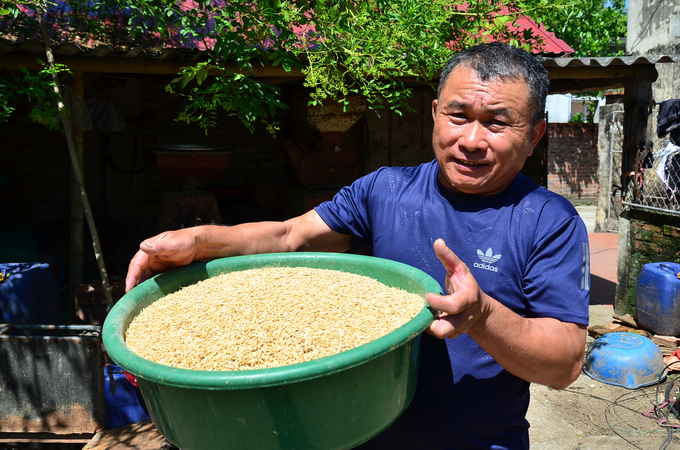
“Big farmer” Nguyen Van Xuyen carried out grains to prepare for rice milling. Photo: Duong Dinh Tuong.
“Big farmer” Nguyen Van Xuyen carried out grains to prepare for rice milling. Photo: Duong Dinh Tuong.
With the desire to learn about the efficiency of each “big farmer”, I came to meet Nguyen Van Xuyen – a “big farmer” in Luc Nam village, Thai Xuyen commune. The 55-year-old man was daring enough to plant 12 mau of rice alone (1 mau equals 10 sao, which is 3600 m2). Three years ago he rented land from people with a fee of 20-30 kg of rice/sao. Now many people are bored with the field and often allow him to rent if asked.
Having two plowing machines and one pump in hand, Xuyen does land service for 40-50 mau of neighbors in addition to his family's farming business. Sometimes, someone finished tilling the land but still abandoned it. Leaving it there would be such a waste, so he has to “fetch” it and tries his best to plant.
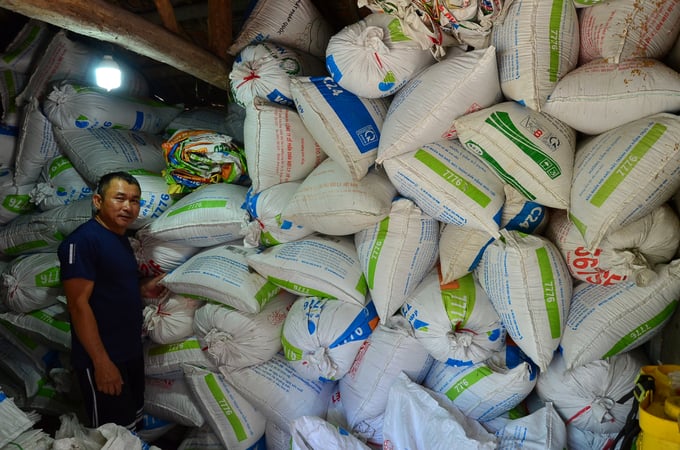
The full granary of Nguyen Van Xuyen the “big farmer”. Photo: Duong Dinh Tuong.
He produces two rice crops, one winter crop with 1-2 mau, mainly vegetables such as cabbage, kohlrabi, and potatoes. His estimated profit was approximately VND 40 million in the spring crop, VND 15-20 million in the seasonal crop, and the winter crop’s profit seems difficult to quantify. But the interesting thing is that for the past 6 years he has also been working as a cook for workers in two factories in the region, providing 150 meals a day on average.
With a price of VND 17,000 per portion, if he went to the market to buy ingredients he would only make a profit of approximately VND 1,000. But his family has rice, vegetables, ducks, and chickens ready, so he can make a profit of VND 2,000/portion, which generated a decent income for both him and his wife. The house's full granary produces 40 kg of rice every day to cook for the workers, and so he can consume more than 10 tons per year by himself while the rest is sold outside.

Everyday Xuyen provides the workers with 150 servings cooked from homemade agricultural products. Photo: Duong Dinh Tuong.
“Doing pure farming, 20 mau of rice is a must to achieve efficiency. Anyway, thanks to combining working as a kitchen to consume the family’s agro-products, with a moderate area we are able to gather an income of VND 7-8 million/month, which equals 1.2 tons of rice already,” Xuyen gleefully said.
After the death of her husband Le Van Binh - a great "big farmer" in My Loc commune, Thai Thuy district, Thai Binh province, Pham Thi Huyen was drowned in sorrow for one whole month. Pointing to the gleamingly yellow rice field ahead, her face looked as if tears were about to pour down. “This might be my last crop. Without my husband, I can't handle all 50 mau of fields alone. In the near future, I plan to work as a worker…”. Leaving the sentence unfinished and holding back a sigh, the young wife in her thirties lit three incense sticks on her husband’s altar.
At first Huyen and her husband only had 3 sao of fields like any other couple who had just moved out in the village. Having the ambition to get rich from farming, they also raised buffaloes in large numbers, up to several dozen heads. But then the thermal power plants appeared and surrounded the riverbank, and the field was contaminated due to people spraying pesticides. There was no longer any grass for the buffaloes to eat, so they had no choice but to sell the herd.
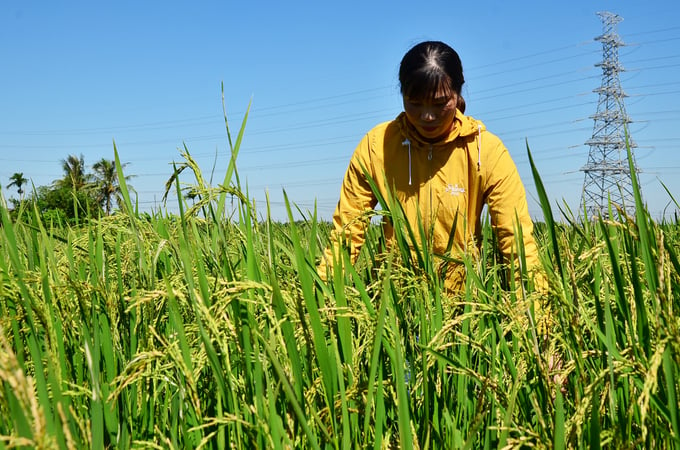
This would likely be Huyen’s last crop because Binh was no longer by her side. Photo: Duong Dinh Tuong.
Binh decided to buy a small plowing machine to plant a few mau of rice on the land that his relatives abandoned. Then gradually more and more people quit farming, he had to literally "fetch" those wastelands, even looking for pieces where weeds grew luxuriantly. Breaking the soil and planting first, questions later.
He "fetched" the whole field of more than 10 mau in Thai Tan commune adjacent to the dike without having to ask anyone. Even when the rice was green, no one bothered to come and claim the field. He " fetched" a few mau of fields like that every crop, usually the next one was larger than the previous one. Many families saw that he was interested in the field, so they called him back and said, "I'll lend you the field. You can just plant to keep the field for me".
When the couple had gathered a lot of lands, they buy large plowing machines, combine harvesters, pesticide sprayers, and nitrogen fertilizer sprayers. Except for the sowing stage which they had to hire people, the couple did all the other steps themselves. After harvesting, they sold fresh rice in the field. Each crop earned them VND 200-300 million, the profit was VND 400-500 million/year. Rice farming was not only enough to feed a family with two children, but they had also bought a new car worth VND 700 million, which made them the talk of the village.
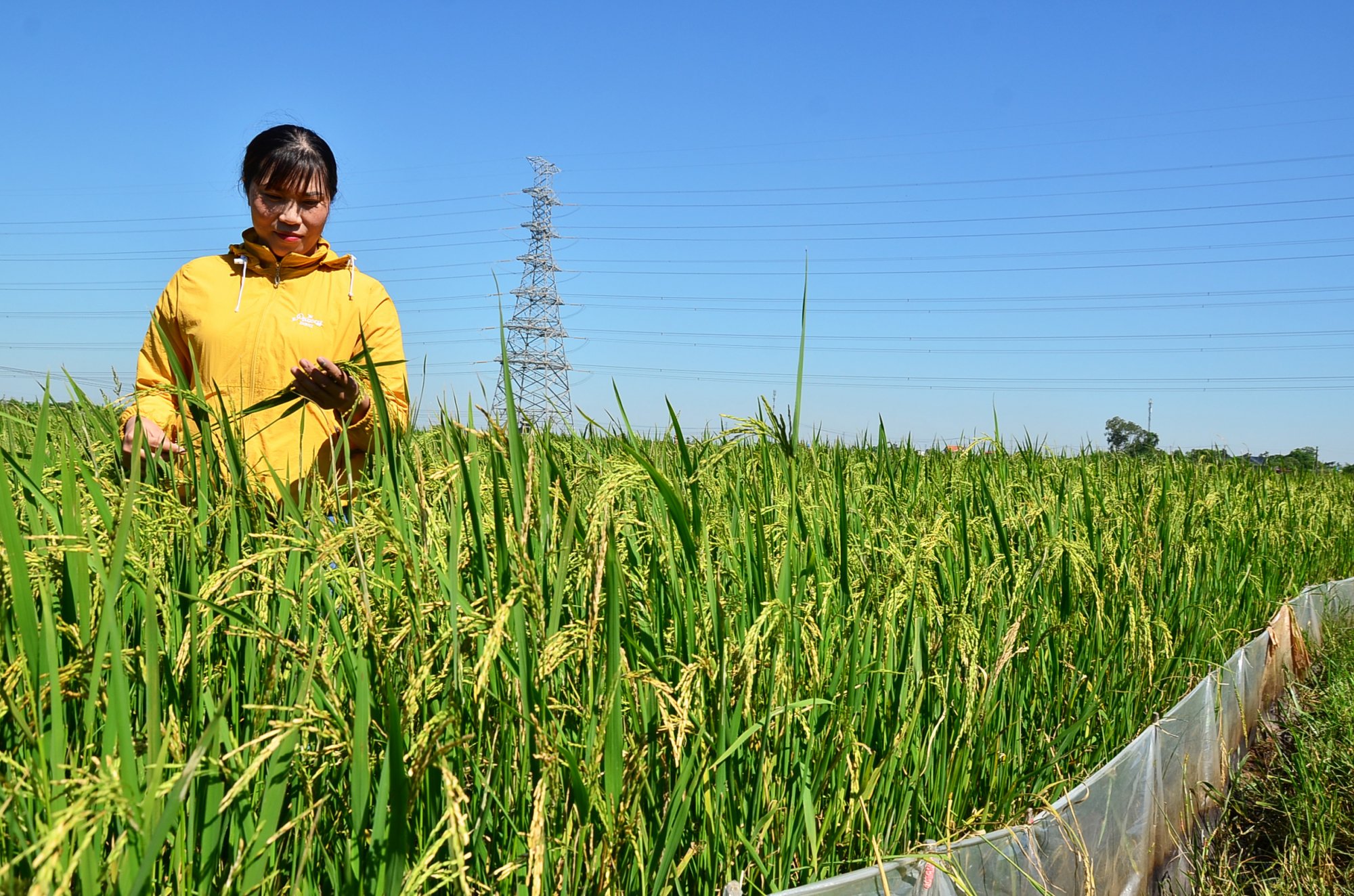
Pham Thi Huyen in the 10-mau field in Thai Tan commune that she and her husband used to "fetch". Photo: Duong Dinh Tuong.
“Every day we have to go to the field to check whether the rat is biting the crop because a moment of distraction might immediately cause us to lose our food. If you see a lot of rats, you have to use rat poison. Spreading over 50 mau of fields requires 1 quintal of rice, equivalent to VND 700,000. Added with the biological bait of approximately VND 1,300,000, you will lose VND 2 million each time. Meanwhile, using electricity does not cost us much, copper wire for the trap can be reused from one crop to another. Every night we can kill over 100 rats. Many villagers also kill mice using electricity like that.
That day, my husband went out to the field to check on the electric traps. To be more careful, I called this one uncle from whom we pulled the electricity to ask if the power was off or not, and he said it was. Unexpectedly, my husband went away and did not return, maybe because this uncle forgot to turn off the power or he did disconnect but was mistaken with other house’s wire as there were also many people ask to pull electricity form his house. My husband passed away, missing the plan to build a new house this October…”
While we were in the middle of the story, Huyen suddenly stopped the car, jumped down, and ran after three buffaloes that were destroying the house’s rice fields. The image of the woman in a hurry running tilted along the sideway on the bumpy inland road full of potholes under the afternoon sun. Below, some families’ bare electrical wires dangled on square foam pieces.
Not only the case of Binh, but recently the wife of another "big farmer" in a commune in Thai Binh city was also crushed to death by a harvester. Two accidents became an obsession among the Provincial Big Farmer Association. In just a few months of 2022 they had lost two great members - people whose whole life is attached to the field, passionate about producing crops and bringing safe products to feed their families and the whole society.
Translated by Samuel Pham
![Turning wind and rain into action: [7] Early disaster warnings help marine farmers minimize losses](https://t.ex-cdn.com/nongnghiepmoitruong.vn/608w/files/news/2025/06/17/z6704423696987_15fd32ffc26d590d204d520c9dac6786-nongnghiep-142942.jpg)
(VAN) In recent years, thanks to early disaster warnings and forecasting, marine farmers in Khanh Hoa province have been able to reduce risks and losses, thereby improving production efficiency.
![Turning wind and rain into action: [6] ‘Four on-the-spot’ disaster management software](https://t.ex-cdn.com/nongnghiepmoitruong.vn/608w/files/news/2025/06/17/e5a48259d6a262fc3bb3-nongnghiep-183800.jpg)
(VAN) By simply activating the scenario on the disaster management software, the relevant authorities immediately know how many households need to be evacuated, where to evacuate them to, and by what means of transportation…
![Turning wind and rain into action: [5] Hue applies modern technology in disaster forecasting](https://t.ex-cdn.com/nongnghiepmoitruong.vn/608w/files/news/2025/06/17/z6704423696987_15fd32ffc26d590d204d520c9dac6786-nongnghiep-093938.jpg)
(VAN) In Hue city, modern technology has recently been applied in meteorological and hydrological forecasting and warning, helping to reduce the damage caused by natural disasters.

(VAN) A cutting-edge farming technique being implemented on an experimental ranch in Arizona's Sonoran Desert has already saved a billion gallons of water over five years, according to Civil Eats.

(VAN) Poultry and pig production and the environment can be boosted through enhanced water technology, according to new research.
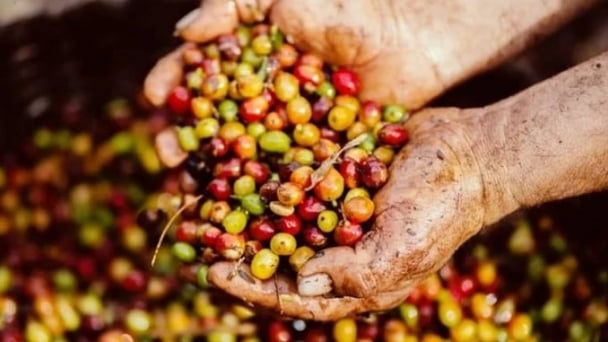
(VAN) Coffee prices on June 16, 2025 are unchanged. In Vietnam, local trading prices are holding steady, ranging around VND 112,000 – VND 112,500/kg.
![Turning wind and rain into action: [4] Bringing climate bulletins to remote and isolated areas](https://t.ex-cdn.com/nongnghiepmoitruong.vn/608w/files/linhnhp/2025/06/14/1152-z6704423696987_15fd32ffc26d590d204d520c9dac6786-nongnghiep-151141.jpg)
(VAN) The Vietnam Agriculture and Nature Newspaper interviewed Mr. Vu Thai Truong, Acting Head of Climate Change and Environment at UNDP Vietnam, to gain deeper insight into how climate bulletins are delivered to farmers.